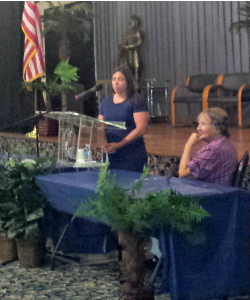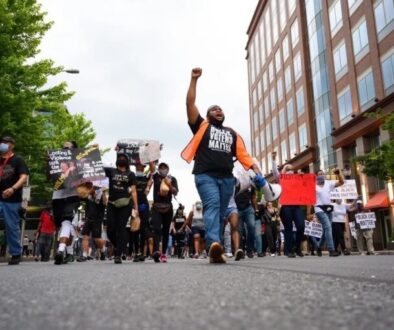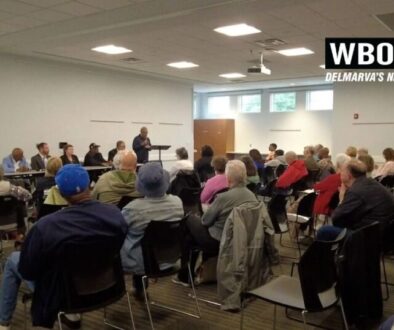Juvenile Justice Reform Successes

August 9 Alliance Meeting Cites Successful Juvenile Justice Reforms

Rachel Gassert, Policy Director at the Louisiana Center for Children’s Rights (LCCR), shared proven strategies for reforming the juvenile justice system at the Southern Delaware Alliance for Racial Justice’s (SDARJ) August 12, 2016 meeting at the Trinity Faith Christian Center in Lewes.
Rachel talked about successes achieved through innovative changes in policies and practices on the state and local levels–many of which can be implemented in Delaware.
- LCCR’s policy arm, The Juvenile Justice Project of Louisiana (JJPL), brought a lawsuit against the state which resulted in the closure of a notorious facility and massive reduction in the facility’s population.
- JJPL and LCCR merged in 2014 to advocate for policy reform and provide zealous, holistic defense advocacy for youth accused of committing delinquent offenses.
- In 2016, LCCR formed the Louisiana Youth Justice Coalition, which advocated for, and successfully passed, a package of four bills to improve the juvenile justice system in Louisiana, including the Raise the Age Act, which will raise the upper age limit of Louisiana’s juvenile justice system so that all 17 year olds are included in the juvenile justice system at the point of arrest by 2020.
Rachel explained that juvenile justice has evolved significantly over the years. It began out of a need to treat kids accused of crimes differently than adult, through a “parental” approach, rather than a punitive one. But as crime rates rose in the 80s and 90s, “tough on crime” policies gained popularities and we started criminalizing normal (and not so normal) adolescent behavior, moving away from a rehabilitative approach, incarcerating more kids, and making it easier to prosecute children in the adult system. The result was overcrowded youth jails and prisons, horrific abuse, zero tolerance policies and problematic laws that we are still trying to roll back today.
But, amidst these problems, a reform effort was born: The Annie E Casey Foundation began the Juvenile Detention Alternatives Initiative (JDAI), a locally-driven reform effort aimed at eliminating the unnecessary and inappropriate use of secure detention (juvenile equivalent of county jail).
JDAI asks system stakeholders to come together through a collaborative and data-driven process to identify policy changes that can reduce the use of incarceration for kids that are arrested and pending a court process. It is about changing the behavior of adults, not kids.
Today, more than 300 jurisdictions in 41 states participate in JDAI. Delaware is one of them. Since starting JDAI, Delaware has reduced the average daily population of youth in secure detention by about half. In total, because of JDAI 80,000 fewer children are admitted into detention centers nationally in JDAI sites, resulting in 1.3 million fewer days spent in secure detention.
Nationally, there has been a significant push to reduce the use of incarceration for youth at all stages of the system, not just in pre-trial detention. There have been locally driven reform to change policy and practices, as well as state legislation, which has resulted in an enormous decline in the use of incarceration for kids.
In 1997, there were about 73,000 kids in locked facilities around the country on a given day, and according to the most recent data (2013), that number is down to about 48,000.
But challenges remain:
- The system has always, and still does, disproportionately affect youth of color. Youth of color are far more likely to be involved in the justice system and to receive harsher punishments than white youth.
- Still criminalizing youth behavior – far too many kids arrested and/or locked up for minor offenses, violations of probation and in some instances, when they have not even committed a delinquent offense (running away, truancy, “ungovernable”)
- The federal government has failed to reauthorize the JJDPA (Juvenile Justice and Delinquency Act), which prohibits this incarceration of status offenders and includes protections for kids in adult facilities, among other things.
- Far too many youth are prosecuted as adults, in a number of ways.
- We have to rethink our approach to youth who commit serious, violent, and chronic offenses. Incarceration is not the answer, but there is not much support for alternatives for this group.
What we can do in Delaware:
- Contact your legislators–politicians do care what you think–at all levels.
- Advocate at the legislature for good bills and against bad bills. Show up for committee hearings–that’s where decisions are made–and form coalitions with like-minded groups.
- Get involve in local elections–let judges, DAs, County Council members, etc. know that you don’t want a “tough on crime” approach, and prefer a focus on rehabilitation and restorative justice.
- Support the Delaware Center for Justice Expungement Drive.











